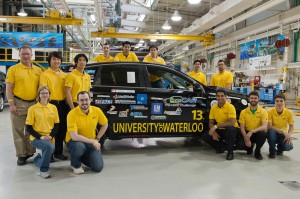On June 16th, the University of Waterloo Alternative Fuels Team (UWAFT) won third place at the EcoCAR Challenge’s year three finals. The EcoCAR Challenge is a three-year Advanced Vehicle Technology Competition which challenges sixteen teams to reengineer a stock General Motors vehicle using an alternative power train.
The EcoCAR Challenge encourages teams to follow “a real-world approach, modeled after GM’s global vehicle development process.” Teams of students from 16 universities — 3 from Canada and 13 from the US — must develop a car that minimizes fuel consumption, greenhouse gas emissions, and petroleum energy use, while maintaining performance, safety, and consumer acceptability.
The University of Waterloo team had worked on the car since September 2008. In year one of the competition, the team designed and modeled the car using math-based design tools. In year two, the team received the stock car from GM and worked on implementing the design for the following two years. Year three of the competition focused on the refinement of the vehicle and multiple outreach efforts.
For this competition, the team chose a fuel-cell hybrid electric vehicle design. The hydrogen fuel cell was donated by GM, which replaced the stock gas engine. Two electric motors were used to give the vehicle its 230 horsepower, four wheel drive capabilities. The team also used a battery pack, donated by A123 Systems, to allow for hybrid operation. With this design, the team achieved a fuel economy of 3 L/100 km, which is an improvement on the stock economy of 12.5 L/100 km. The fuel cell car also had zero tail pipe emissions, with the exception of water.
The first half of the competition took place at General Motor’s Proving Grounds in Milford, Michigan. In a tragic turn of events, the team arrived at competition with a vehicle that did not run. A few days before shipping, the front power electronics failed. This meant that the team had to replace these components before they could compete. After three days of work, the team passed safety inspection and was entered into the events. These events included 0-100 km/h acceleration and braking. The car also had to undergo a drive of 160 miles without fault to measure its efficiency. There was a towing event where the vehicle towed a trailer at 45 miles/h. Drive quality and consumer acceptability were also judged. Finally, there was an autocross event where teams raced around a GM track. The team placed second by 0.023 s. It was a huge surprise because the team didn’t expect to do well in the autocross event. They wanted to take it slow to ensure they could run through all the events. However, on the last lap, they told the GM driver to give it his all, and he showed that fuel cell cars can run fast, too. The Waterloo team managed to finish all events without fault. Each event gave the team points towards their total score.
After a week at the GM proving grounds, the team headed to Washington, D.C. for the second part of the competition. The second part of the competition consisted of presentations that included both technical and outreach components. The outreach component included community events with vehicle, educational events, and more. The team placed first in “Best Media Relations Campaign,” “Best Sponsor Success Story,” “Best Consumer Campaign,” “Best Final Presentation,” and, as a result, won first place for “Best Overall Outreach Program.” The competition concluded with a ceremony at the Library of Congress in Washington, D.C. where the team received the award for third place overall.
The team has been accepted into EcoCAR 2, another 3 year competition. For EcoCAR 2, the team will be working on a 2013 Chevrolet Malibu. Although the competition officially starts in September, UWAFT team members are planning to work on it all summer. After a strong finish in the EcoCAR Challenge, the team hopes to be successful in the upcoming competition. For more information about the team, or to find out how to get involved, visit their website at www.uwaft.com.



Leave a Reply